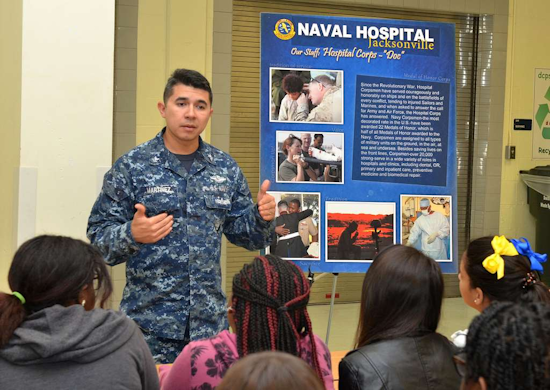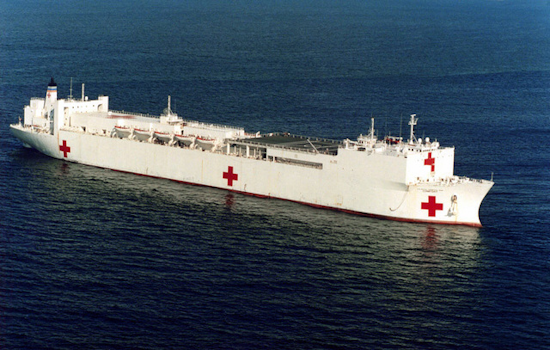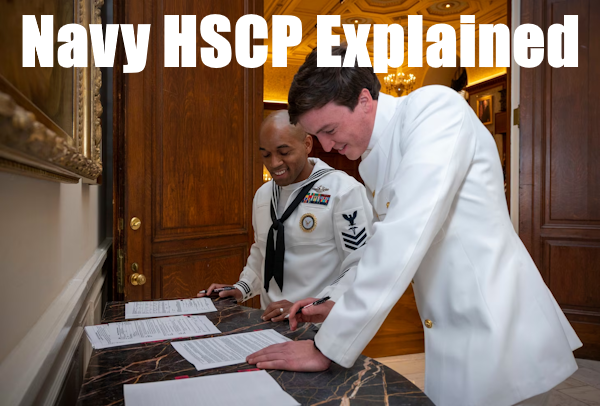The Navy Health Services Collegiate Program (HSCP) can completely change your life for the better.
The program offers military pay and benefits to those who want to attend medical school.
As a result, the Navy HSCP covers most costs associated with a future career in the healthcare profession as a Naval officer.
Learn more about the Navy HSCP program including requirements and expectations, below.
Related Article – Navy HM Hospital Corpsman: Everything You Wanted To Know
Table of Contents
What is Navy HSCP?

The Navy Health Services Collegiate Program (HSCP) is designed to offer financial incentives for students seeking to finish med school.
For this reason, the scholarship program can help students complete their degree or certification.
Moreover, doing so through the Navy HSCP usually allows students to graduate college debt-free, which is nearly impossible to do otherwise.
Afterward, graduates of the program receive commissions in the following Navy healthcare organizations:
- Medical Corps (MC)
- Dental Corps (DC)
- Medical Service Corps (MSC)
The Navy Health Services Collegiate Program (HSCP) is different from other scholarship programs offered through the service branch.
For starters, the Navy HSCP awards full military pay and benefits while attending college, rather than financial aid for tuition.
The monthly pay is designed to help students with the cost of living (housing, food, transportation) and tuition.
Additionally, those that qualify for Navy HSCP (more details, below) also may be eligible for a substantial signing bonus.
Navy Health Services Collegiate Program (HSCP)
Navy HSCP was established to provide financial means for those who would otherwise be unable to attend medical school.
As a result, more than 4,300 active duty and reserve physicians currently practice or train under Navy HSCP.
Students have the option of focusing on more than 20 different medical and surgical specialties.
Then, after completing the educational requirements, graduates have a service obligation (more information, below).
Navy physicians are stationed across the nation and throughout the world at military treatment facilities.
These include medical education institutions, clinics, military hospitals, research centers, and even aboard aircraft carriers.
Navy physicians are responsible for providing direct medical support to both the U.S. Navy and Marine Corps commands, squadrons, battalions, and units.
Therefore, there is no shortage of opportunities for those willing to push and challenge themselves through med school.
Navy physicians also are deployed to support combat operations, disaster relief, and humanitarian efforts.
Accordingly, Navy physicians often get to see the world and practice in a wide variety of locations and settings.
Navy Medical / Education Programs
There are numerous ways to join the Navy, regardless of whether you are already in college, attending med school, or a practicing physician.
As such, there are multiple scholarship programs dedicated to providing financial assistance for med students, including:
- Navy Health Services Collegiate Program (HSCP)
- Navy Health Professional Scholarship Program (HPSP)
- Direct Officer Commission For Practicing Physicians
The Navy HSCP is comparable to the Health Professional Scholarship Program (HPSP) in that both provide individuals with an opportunity to receive an education in healthcare without incurring an enormous debt for their education.
However, the Navy HSCP provides military pay and benefits at the pay grades of E6 or E7, instead of direct financial aid for tuition.
Therefore, students under the scholarship program also receive a generous housing allowance (depending on location) and a comprehensive benefits package.
Navy HSCP is also different from the HPSP program in that it is exclusive to the service branch. That’s because the Surgeon General of the Navy is the resource sponsor.
As such, Navy HSCP is not available for students who seek a commission in another branch of the U.S. Armed Forces.
Related Article – Military Dental Requirements And Disqualifications
Navy HSCP Pay & Benefits

There are several noteworthy benefits to the Navy Health Service Collegiate Program (HSCP).
First, upon selection for participation in the scholarship program, students receive full military pay and benefits.
Civilians and enlisted Sailors at or below the pay grade of E-6 are promoted to Petty Officer First Class (E-6).
Officers and enlisted members at the pay grade of E-7 or above are reenlisted as E-7s for the duration of their education.
The military benefits include the monthly base pay at the pay grades above, as well as their monthly housing allowance (BAH) and Basic Allows for Subsistence (BAS).
Navy medical and dental students also earn 30 days of leave each school year.
Furthermore, full medical and dental insurance is provided through TRICARE.
Currently, this sum amounts to approximately $269,000 in living costs.
Lastly, the time students spend in school also counts toward military service.
So, it will take less time to qualify for those benefits compared to someone who enlisted without attending college.
Navy Medical Careers
There are many medical careers to consider under the Navy HSCP program.
Currently, the scholarship program provides financial assistance and a monthly stipend for the following medical fields:
- Medicine
- Dentistry
- Healthcare Administration
- Environmental Health
- Industrial Hygiene
- Occupational Audiology
- Pharmacy
- Occupational Therapy
- Podiatry
- Entomology
- Physician Assistants
Students can learn more about the various medical programs available by visiting the official website.
Navy HSCP Qualifications & Requirements

The Navy Health Services Collegiate Program is open to citizens of the United States and between the ages of 18 – 42. Age waivers up to 47 may be available, depending on specialty and other factors.
Secondly, the steps and requirements for applying to Navy HSCP vary depending on whether the individual is already enlisted or attending college.
Enlisted military personnel are required to submit a conditional release from active duty along with a copy of their Performance Summary Record (PSR) and the 3 most recent years of evaluations.
Meanwhile, officer candidates for Navy HSCP must submit a conditional resignation from active duty, along with an Officer Summary Record (OSR) and the 3 most recent years of Fitness Reports.
The process is different for individuals who have never served in the United States Navy before.
In general, HSCP is primarily intended as a civilian direct procurement program.
Consequently, the majority of new enrollees are civilians who are seeking to attend medical school or already attending medical school.
Civilians who are interested in joining the Navy as a doctor or dentist need to carefully follow the educational guidelines (more details, below).
Finally, interested candidates must meet the physical standards and requirements for service in the U.S. Navy.
Since the benefits of the program (more information, below) are quite generous, the selection process for Navy HSCP is extremely competitive.
Therefore, not everyone who applies for the program will receive the scholarship and associated benefits.
Navy HSCP Education Requirements
The Navy Health Services Collegiate Program offers tuition assistance even if the income comes through military pay and benefits.
However, there are many stipulations that applicants must meet in order to qualify for Navy HSCP.
For starters, applicants must be enrolled in, or accepted for enrollment or transfer to an accredited college or university for a designated health profession.
Unfortunately, online and distance learning degree programs do not meet this requirement.
In fact, the medical school must be accredited through the Liaison Committee for Medical Education or the American Osteopathic Association Commission.
Meanwhile, dental students must attend a school accredited by the American Dental Association.
The U.S. Navy expects students to earn their degree or certification requirements within one to four years after enlistment.
The specifics depend on the type of medical or dental program, along with the demands and expectations of the college program.
Therefore, applicants must have an approved degree or course of study completion plan prior to enlistment.
For this reason, it’s crucial that applicants have a strong cumulative grade point average (generally a 3.0 GPA or higher).
Additionally, students must complete their studies or training as full-time students maintaining a GPA of 2.5 or higher.
Those who are interested in applying need to submit their official transcripts for consideration.
The military branch has the authority to remove an individual from the HSCP program at any time for failing to maintain the required 2.5 GPA.
Contact a Navy recruiter if you have other questions related to the HSCP program.
Navy HSCP Service Obligation
Students under Navy HSCP are expected to fulfill a service obligation after completing medical or dental school.
The total commissioned obligation is 8 years with part of that time spent on active duty.
Therefore, the active duty commissioned obligation is for a minimum of 3 years from the date of commissioning (or as stated in the member’s service agreement).
Meanwhile, the remainder of the service obligation is performed in a chosen reserve unit.
The time requirements are similar for the Dental Corps (DC) and Medical Service Corps (MSC).
Those who require 4 years to complete their education will also need to serve an additional year of active duty service.
In general, the service obligation is considered part of the compromise for receiving a large scholarship award.
HSCP students are expected to maintain communication with the local Navy Talent Acquisition Group (NTAG).
The NTAG is responsible for ensuring students meet minimal physical fitness criteria while attending school.
The purpose of NTAG is to maintain military awareness and professionalism.
Consequently, any type of civilian misconduct or military conviction may be grounds for removal from the program.
Those with additional questions about Navy HSCP can reach out with further questions by email: [email protected]
Related Article – Navy Nurse Program: Requirements & Responsibilities
Conclusion
The Navy Health Services Collegiate Program (HSCP) is a scholarship that offers impressive financial incentives and rewards.
Students of the program attend dental or medical school with tuition assistance provided by the U.S. Navy.
The HSCP program is different from the Navy HPSP program in that it doesn’t grant direct financial aid toward tuition.
Instead, students earn full military pay and benefits while attending school
The military pay, housing allowance, and subsistence allowance are designed to cover both tuition and living expenses. Students can make up the remainder of tuition fees with their G.I. Bill, grants, and/or student loans.
Students who qualify for the program gain commission in the Navy Medical Corps (MC), Dental Corps (DC), and Medical Service Corps (MSC) upon graduation and certification.
The qualifications and education requirements of Navy HSCP vary depending on whether the individual is already serving in the military branch or attending college.
- Replacing Dog Tags: 6 Things You Need to Know - June 28, 2024
- Navy OAR Test Study Guide - June 24, 2024
- 10 Best Sniper Movies of all Time - June 20, 2024
Originally posted on July 25, 2023 @ 5:19 pm
Affiliate Disclosure: This post may contain affiliate links. If you click and purchase, I may receive a small commission at no extra cost to you. I only recommend products I have personally vetted. Learn more.

